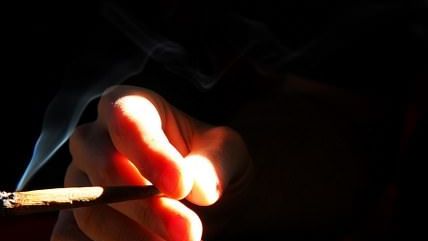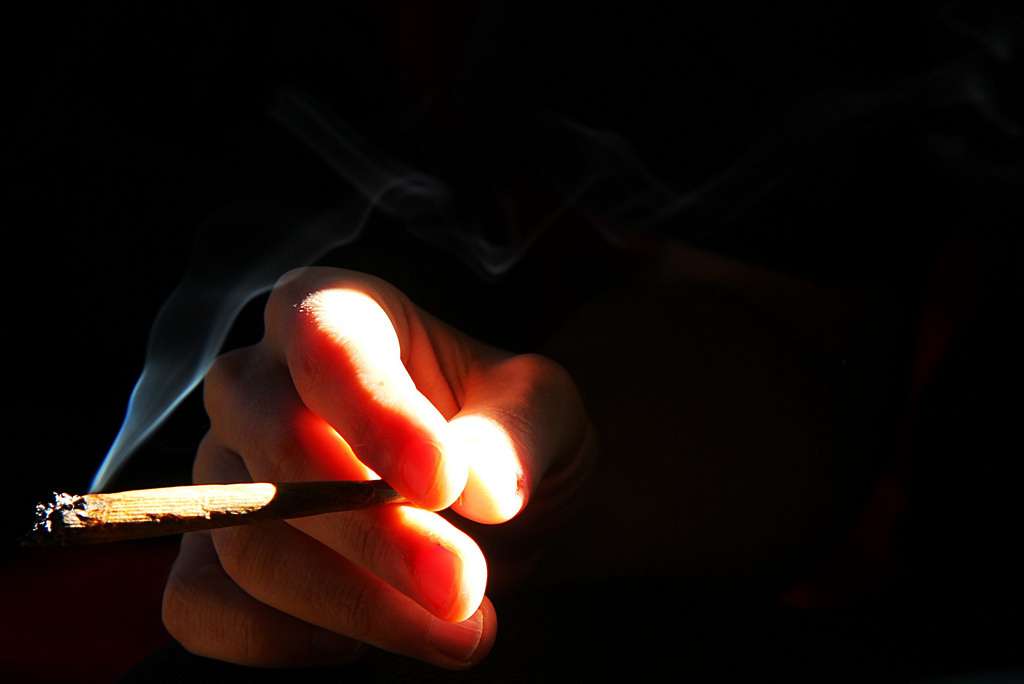This Is What Legalizing Marijuana Did to the Black Market in Colorado
Illegal pot dealers still undersell licensed marijuana merchants in Colorado, but their advantage may be fading.


On New Year's Day, when Toni Fox became the first state-licensed marijuana merchant in Colorado to serve recreational customers, nearly 200 reporters crowded into the 3D Cannabis Center while hundreds of customers waited patiently outside the store. "It was controlled chaos," she recalls with a smile. "We saw close to 500 people that day. We ended up turning away over 300 people."
Business since then has been brisk, validating Fox's decision to switch completely from medical to recreational marijuana. "Pre-2014," she says, "we were seeing, on average, 25 customers a day, doing $1,000 a day in sales. Today we see, on average, 200 people a day, and we're doing $11,000 a day in sales. In the first three months of recreational sales, I did as much as three years of medical revenue." It does not hurt that Fox's store is conveniently located for tourists, on the way into Denver from the airport.
Fox has had no trouble attracting customers even though she charges substantially more than black-market dealers do: about $60 for an eighth of an ounce after taxes, compared to something like $40 for pot of similar quality purchased from unlicensed sellers in Colorado (judging from Craigslist ads and PriceOfWeed.com, a website that collects data from consumers, and assuming a 30 percent discount for buying an entire ounce). Some dispensaries in mountain resort towns charge as much as $70 for an eighth after taxes, and people happily pay it.
"It's a night-and-day difference between medical and recreational," Fox says. "We did medical for three years. We operated in the red. We dealt with patients who were on serious budgets, who were making sacrifices to get their cannabis. They wanted the best price. Something extra. There was always negotiating. And they were always making a conscious choice on whether they were going to use cannabis or pharmaceuticals. Their pharmaceuticals are covered under insurance, but cannabis helps them, so it's a vicious struggle. And everybody is sick and wants to tell you why they need the cannabis because they're sick. With recreational, it's tourists coming in with cash, pockets full of money, saying, 'I want the best. I can't believe this is happening. This is amazing.' Night and day."
'Black-Market Prices Are Definitely Lower'
Visitors from other states, eager to enjoy the novelty of legal weed, may not blink at the prices, especially if black-market dealers where they live charge about as much. But locals, especially regular consumers, are apt to be more price-sensitive. The owner of one mountain dispensary told me he has one set of prices for tourists, and a different, lower set for locals. Many consumers balk even at those prices, which helps explain why the black market persists in Colorado in spite of legalization. How long that situation will last is an important question for Colorado and for other states that are considering following its example, since eliminating the black market is one of legalization's main selling points.
"The black-market prices are definitely lower than recreational prices," says Michael Elliott, executive director of Colorado's Marijuana Industry Group. "The taxes are a big reason why, the new testing requirements, the packaging requirements, and basically this whole hurdle of the extraordinary expenses people have had to go through to open these businesses. Another reason is that the businesses have had limited supply." The supply problem was especially acute in the early months, before the first harvests of plants raised for the recreational market, when repurposed medical marijuana was the only source.
The relatively high prices may help explain why the number of medical marijuana patients registered with the state Department of Public Health and Environment rose from 106,763 in November 2012, when voters approved Colorado's legalization initiative, to 115,210 in May 2014. The increase is not huge, but other things being equal you might have expected that number to shrink during this period, assuming that recreational users posing as patients would shift to the general market, where you can buy marijuana without a bureaucratic hassle. But patients are exempt from most of the taxes on marijuana, and dispensaries generally charge them less to begin with.
Although some conditions covered by Colorado's medical marijuana law, such as cancer and HIV/AIDS, are pretty hard to fake, by far the most commonly reported condition, accounting for 94 percent of registration cards, is "severe pain," which cannot be objectively verified. "It is no secret in Colorado that some medical marijuana users use that market without a legitimate medical need," writes Brookings Institution fellow John Hudak in a July 2014 report on Colorado's regulatory rollout. "The state has an obvious interest in moving some 'gray-market' medical consumers to the new retail market. Unfortunately, the tax and fee structures for medical and retail marijuana did nothing to limit gray-market activity."
Nick Brown, co-owner of a company that specializes in cannabis-oriented tours, obtained a medical card based on lingering pain from an old shoulder injury. "It's a scam," Brown says. He adds that "anyone who uses cannabis regularly" should consider registering as a patient. According to figures from the Colorado Department of Revenue, medical sales exceeded recreational sales by 65 percent in the first six months of this year, although the ratio shrank during that period, almost reaching parity in June.
'$10 and $15 Eighths'
The advantages of a medical card should wane as supply rises and recreational prices fall. Kayvan Khalatbari, co-owner of Denver Relief, a medical dispensary that started serving recreational consumers in July, says after-tax prices in that market average $50 to $60 per eighth. He expects those prices to plummet by next year, however, as growers ramp up production and new suppliers enter the market. As of October 1, dispensaries no longer have to grow 70 percent of their inventory, and businesses dedicated to cultivation will be allowed.
"I would not be surprised, given the flood that's going to happen, if we see $10 and $15 eighths by early next year," Khalatbari says. "I would believe that. I could see ounces being sold for $50. I truly see that happening, because there is going to be so much competition [and] people are becoming so efficient in their production. They're automating much more. We're seeing best practices settle in. There's less risk in operating because people are operating at a higher level. I think we're going to become a very efficient industry very quickly. We're going to see competition, and we're going to see prices hit rock bottom early next year." At that point, he predicts, the black market will dwindle away.
Elliott agrees that "it will be harder and harder for the black market to compete," although he is reluctant to specify a time frame. He adds that black-market dealers will continue to thrive in parts of Colorado where local governments have banned pot stores. "The eastern plains of Colorado, which is about a third of the state, you're not going to find any marijuana businesses out there," he says. "They've banned the market."
This article originally appeared in print under the headline "Legalizing MJ."


Show Comments (26)